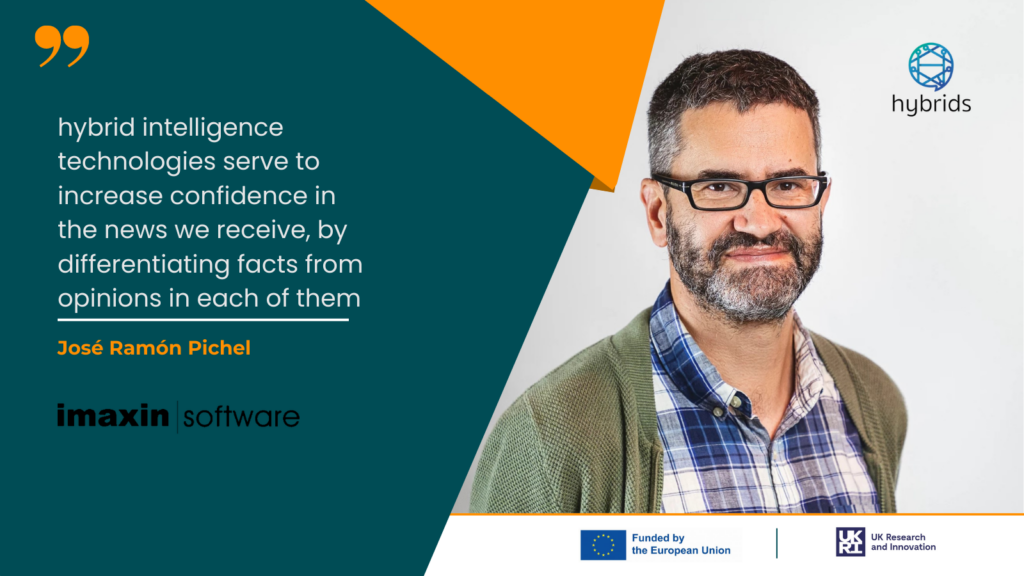By Maria Campins, Newtral
José Ramón Pichel is the Research and Development Director at Imaxin Software (Spain) and a member of the HYBRIDS project. Throughout this initiative, the acronym of Hybrid Intelligence to monitor, promote and analyse transformations in good democracy practices, top 14 institutions will collaborate in the following years to promote different approaches on the basis of an exhaustive analysis of public discourse about crucial global issues, such as health, climate crisis, European scepticism or immigration, which will take into account both traditional media and content published through social media.
He is a computer engineer interested in the survival of endangered, minorized, and minority languages, promoting worldwide cultural diversity. His main scientific interest is natural language processing, with a focus on machine translation. He also created, with a group of friends, the company Imaxin Software and developed applications and tools in natural language processing.
How important is natural language processing in creating tools capable of fighting disinformation?
Disinformation from whatever source is a serious problem in a period of over-information in which we live. Natural language processing can be a good tool to help detect it automatically, especially using new systems based on deep learning techniques as well as with some hybrid knowledge-based strategies.
How can hybrid intelligence help detect problems in modern democracies?
Snowden revealed that disinformation is a strategic line in spy agencies linked to Western states, such as the United States. If this happens in these states, it is much more likely in oligarchic democracies. Not to mention other violent fringe groups. Therefore, these hybrid intelligence technologies serve to increase confidence in the news we receive, by differentiating facts from opinions in each of them. In addition to this misinformation, there are other challenges in modern democracies related to protecting underprivileged minorities and hate crimes, where these technologies can also help a lot.
Which questions do you want to solve through the Ph.D. student assigned?
In our case, we mainly want to research the alignment of the different media in relation to certain ideologies or party agendas and therefore detect the so-called partisanship and hyper-partisanship in the news we receive daily. Yet, as we will have different theses assigned to us, we are also interested in different topics such as detecting toxic political bots on Twitter, analysing the role of disinformation to automatically identify hate speech against immigrants in the multilingual social environment, automatically characterising micro-level discursive structures from social networks, or detecting harassment on social networks beyond isolated messages.
What are some of the challenges you face in your research?
As I have previously commented, we especially would like to detect through intelligent and hybrid natural language processing techniques, the degree of partisanship that exists in the news in relation to certain party agendas. One of the great challenges is to be able to distinguish through the headlines of the news between factual information and opinion. And within this, the degree of alignment with models extracted from party agendas is put into circulation by political parties and other related organizations.
What do you aim to achieve with HYBRIDS?
From a business point of view our aim is to think of different use cases that help to frame the objectives of the thesis in these topics in some way. From a human point of view, which is more important than the previous one, our aim is to provide a comfortable and stimulating framework for those researching these topics, and above all to learn from the conclusions they reach.

